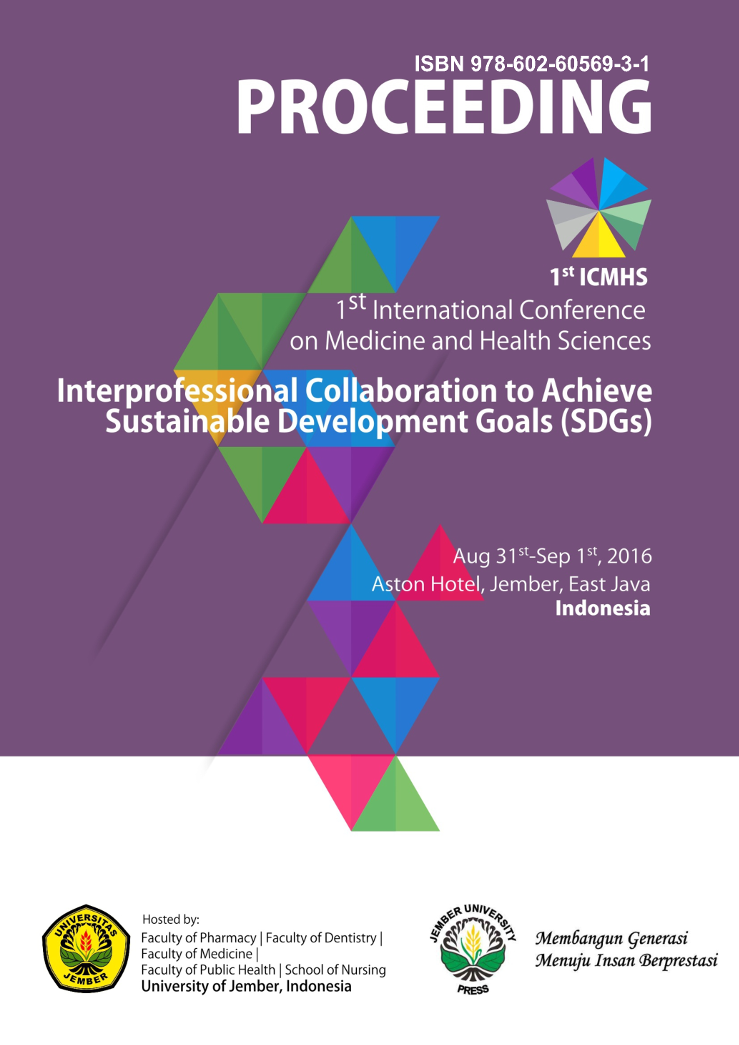DETERMINANTS OF HIV/AIDS AWARENESS AND KNOWLEDGE IN TANAH PAPUA, INDONESIA
Abstract
Human Immunodeficiency Virus (HIV) infection has
been a major global health issue. HIV infection not
only affects the health of a population, but also
significantly impacts the economic and social
environment as well6. In Indonesia, the prevalence
of HIV infection among 15-49 year olds was
estimated around 0.4% in 20138. However, across
two provinces in Tanah Papua, namely West Papua
and Papua, the epidemic was extremely high with
HIV prevalence at 2.3% among general population
which categorized as a generalized population
epidemic level, based on WHO classification8. The
high HIV prevalence in Tanah Papua suggests the
need for prevention strategies that consider the
local context. One of strategies for HIV prevention
programs is to assess HIV/AIDS knowledge of
populations14.
Knowledge on HIV and AIDS is an important
prerequisite for the adoption of behavioural
changes to prevent the risk of HIV transmission4.
Assessing factors that contribute to the perceived
knowledge of HIV/AIDS is essential to prioritize and
deliver effective HIV prevention programs in Tanah
Papua. HIV knowledge has been shown to be
determined by wider societal aspects such as,
socioeconomic status, social networks and
community characteristics9,13. Understanding the
association of these factors are important aspects to
consider when designing HIV prevention programs in
communities. Such studies can be useful for
HIV/AIDS service providers better understand the
mechanism through which HIV/AIDS messages are
transmitted and received by individuals in the
community9.
However, the literature on HIV/AIDS knowledge and
its determinants in Tanah Papua, Indonesia is limited
despite the relatively high prevalence of HIV in
Tanah Papua. Previous studies on socioeconomic
factors and HIV/AIDS knowledge in Indonesia are not
comprehensive and only focus on the association
between HIV/AIDS knowledge and individual
socioeconomic characteristics in risky populations.
Additionally, no studies have investigated the link
between community socioeconomic characteristics,
social capital and HIV/AIDS knowledge in these
provinces.
Therefore, the aim of this study is to assess HIV/AIDS
awareness and knowledge and to examine an
association between individual characteristics,
community participation, community characteristics
and HIV/AIDS awareness and knowledge among 15
years older in Tanah Papua Indonesia.
been a major global health issue. HIV infection not
only affects the health of a population, but also
significantly impacts the economic and social
environment as well6. In Indonesia, the prevalence
of HIV infection among 15-49 year olds was
estimated around 0.4% in 20138. However, across
two provinces in Tanah Papua, namely West Papua
and Papua, the epidemic was extremely high with
HIV prevalence at 2.3% among general population
which categorized as a generalized population
epidemic level, based on WHO classification8. The
high HIV prevalence in Tanah Papua suggests the
need for prevention strategies that consider the
local context. One of strategies for HIV prevention
programs is to assess HIV/AIDS knowledge of
populations14.
Knowledge on HIV and AIDS is an important
prerequisite for the adoption of behavioural
changes to prevent the risk of HIV transmission4.
Assessing factors that contribute to the perceived
knowledge of HIV/AIDS is essential to prioritize and
deliver effective HIV prevention programs in Tanah
Papua. HIV knowledge has been shown to be
determined by wider societal aspects such as,
socioeconomic status, social networks and
community characteristics9,13. Understanding the
association of these factors are important aspects to
consider when designing HIV prevention programs in
communities. Such studies can be useful for
HIV/AIDS service providers better understand the
mechanism through which HIV/AIDS messages are
transmitted and received by individuals in the
community9.
However, the literature on HIV/AIDS knowledge and
its determinants in Tanah Papua, Indonesia is limited
despite the relatively high prevalence of HIV in
Tanah Papua. Previous studies on socioeconomic
factors and HIV/AIDS knowledge in Indonesia are not
comprehensive and only focus on the association
between HIV/AIDS knowledge and individual
socioeconomic characteristics in risky populations.
Additionally, no studies have investigated the link
between community socioeconomic characteristics,
social capital and HIV/AIDS knowledge in these
provinces.
Therefore, the aim of this study is to assess HIV/AIDS
awareness and knowledge and to examine an
association between individual characteristics,
community participation, community characteristics
and HIV/AIDS awareness and knowledge among 15
years older in Tanah Papua Indonesia.
Downloads
Download data is not yet available.
Downloads
Published
2017-01-27
Issue
Section
General


